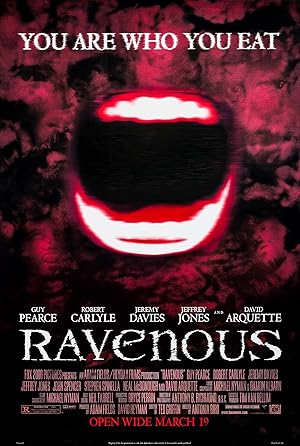Ravenous has been in my queue even before I had a queue because it looked terrifying. I’m not sure why it took me so long to see it. Ravenous is set during the Mexican American War and focuses on an unlikely hero, played by Guy Pearce, with a strange experience in battle. Unfortunately this experience is only a first step in this hero’s journey as opposed to an anomaly. The hero and his unit encounter a man who urges them to punish the villainous leader of a wagon train. The hero discovers that his nightmare has only just begun as he must decide who he wants to be.
Ravenous is a lot more campy and humorous than I was prepared for. Ravenous is not just a movie about cannibals as vampires, i.e. wendigoes, but a movie about a war of stories as told by two similar and completely unalike men, Pearce’s character and Robert Carlyle’s character. Both men may be Caucasian, but one was born in America, and the other is an immigrant from Scotland. One is more comfortable with redefining moral standards to suit himself, and the other is never comfortable even when adhering to them. One changes his identity often and easily, but the other maintains his military identity while completely being repulsed by it.
Ravenous is about the story we want to hear and believe, which constantly changes depending on the audience, versus the story that may be true, but we don’t believe or if we do believe, we find the storyteller more revolting than the person who is the actual threat. I confess that I still don’t completely understand why people do not like or believe Pearce’s character as the movie unfolds, particularly Martha, a Native American woman who works at the outpost. Unlike the others who don’t believe Pearce’s character and suspect that Pearce’s character is actually responsible for the murders and disappearances, Martha clearly knows about wendigoes and believes Pearce’s character’s allegations, but instead of being afraid of the accused Wendigo, she is also openly hostile to Pearce’s character and views him as an equal if not worst threat. Why? Martha seems to believe that despite his efforts to eliminate the evil, Pearce’s character is also a Wendigo, and his moral reservations and limitations are not enough to eliminate his real identity.
Ravenous reveals the real horror of the Wendigo is not just that he is a cannibal and a murderer, but he also shares an uncomfortable correlation with the military and Christian identity in the way that those identities contributed to Western expansion that led to a metaphorical insatiable cannibalism of a people, Native Americans, animals and the environment, regardless of how seemingly beneficial the original intent was. Ravenous equally condemns Pearce’s character as a villain because he is a beneficiary and a part of this system even if he does not want to be. Ravenous explains that it is not enough to condemn and repent of wrongdoing, but completely be willing to eliminate the problem and possibly yourself in the process. The reason that no one trusts Pearce’s character may be because he has not truly chosen a side. His actions and his beliefs are at constant conflict until the end of Ravenous.
Ravenous’ actors and atmosphere keep the movie’s momentum dynamic. While the ideological underpinning of Ravenous is strong, the actual story is uneven. I was immediately suspicious of the first Wendigo’s story and could not believe that the other characters were not more suspicious after Pearce’s character’s warning. I was not aware until after watching Ravenous that the story has so many historical sources: the Donner party, Alferd Packer, and the Sawney Bean legend. Perhaps that is another reason why Ravenous is such a good movie even when it falters.
I have always been a Robert Carlyle fan. He is the ONLY reason that I still watch Once Upon A Time (well, I haven’t seen one episode of the fifth season, but I will). He gets the Steve Buscemi award for being hot because he is so talented. Carlyle brings an innate dark charisma and sexiness to Ravenous that Buscemi could not. While I love Pearce, Ravenous is Robert Carlyle’s movie. Jeffrey Jones also steals quite a few scenes, and his philosophizing colonel helped me to understand the story.
Stay In The Know
Join my mailing list to get updates about recent reviews, upcoming speaking engagements, and film news.





